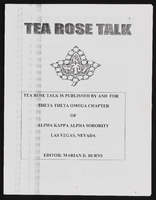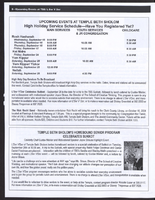Search the Special Collections and Archives Portal
Search Results

Alpha Kappa Alpha Sorority, Theta Theta Omega Chapter "Tea Rose Talk" newsletters
Date
Archival Collection
Description
From the Alpha Kappa Alpha Sorority, Incorporated, Theta Theta Omega Chapter Records (MS-01014) -- Chapter records file.
Text
University of Nevada, Las Vegas Creative Services Records (1970s)
Identifier
Abstract
This is part 1 of 6 finding aids for the University of Nevada, Las Vegas Creative Services Records and represents 1970 to 1979. Generally, materials are transferred from UNLV Photo Services to UNLV Special Collections and Archives 5 years after they are created. For materials within the last 5 years, email photo@unlv.edu or call 702-895-3036. This finding aid contains the photographic negatives and contact sheets produced by the University of Nevada, Las Vegas from 1970 to 1979 as an official record of the institution's development, activities, and community. Clients include UNLV colleges and departments, the University's administration, the UNLV Foundation, athletic departments, and the Nevada System of Higher Education (NSHE). Images include academic activities, athletic events, faculty and administration, student life, campus life, campus development, architecture, and public relations.
Archival Collection
John Levy Lighting Productions, Inc. Records
Identifier
Abstract
The John Levy Lighting Productions, Inc. Records (approximately 1990-2022) contain correspondence, invoices, contracts, expense reports, newspaper and magazine clippings, photographs, slides, and digital files detailing the development of various projects primarily in Las Vegas, Nevada. The records also contain architectural lighting drawings, electrical schematics and design details, conceptual sketches, and artist renderings of projects in Las Vegas, throughout United States, and various international locations.
Archival Collection
Amy Ayoub Papers
Identifier
Abstract
The Amy Ayoub Papers (1906-2022) document the life and career of Amy Ayoub, a long-time resident of Las Vegas, Nevada. The collection consists of correspondence, photographs, newspaper clippings, research, and other material that document the numerous facets of Ayoub's life. The collection covers many areas: Ayoub's early childhood; her family, including father Bobby Ayoub and stepfather Raymond Sutton; her financial consulting career and political work; her experience working as a prostitute in Nevada and subsequent documentary about being sex trafficked and working in brothels; time spent as the first female Nevada Athletic Commissioner; and more. Digital files include audio and video files of Mike Tyson's 2002 licensure hearing, and video of Ayoub's testimony before the Nevada State Assembly Judiciary Committee for Assembly Bill 67 in 2013. There are also digitized photographs that Ayoub used for the documentary The Zen Speaker: Breaking the Silence.
Archival Collection
Wilbur and Toni Clark Papers
Identifier
Abstract
The Wilbur and Toni Clark Papers date from 1944 to 1991, with the bulk from 1953 to 1963 and document the lives of Wilbur and Toni Clark in Las Vegas, Nevada and the development of the Desert Inn Hotel and Casino. The collection includes correspondence from Wilbur Clark to those he identified as important individuals including government officials and celebrities. It also includes materials related to Clark’s plan of building luxury apartments near the Desert Inn, and newspaper clippings and scrapbooks about the Clarks and the Desert Inn. The collection contains some audiovisual materials including Wilbur and Toni Clark's home movies, news footage, and film footage of Las Vegas, Nevada and the Desert Inn.
Archival Collection
Las Vegas Chamber of Commerce Records
Identifier
Abstract
The Las Vegas Chamber of Commerce Records (1911-2020) contain organizational documents from the Chamber’s history, including administrative and financial records, legal documents such as ordinances and legislation, newsletters and promotional guides, advertising and publicity materials for the city and its retailers, and original photographic prints, negatives, and reproductions. The collection also contains audiovisual materials featuring Las Vegas Chamber of Commerce events from approximately 1997 to 2013.
Archival Collection

Danny Cluff oral history interview: transcript
Date
Archival Collection
Description
Oral history interview with Danny Cluff conducted by Claytee D. White on December 8, 2017 for the Remembering 1 October Oral History Project. In this interview, Danny Cluff discusses his attendance at the Route 91 Harvest music festival on the evening of the October 1, 2017 mass shooting in Las Vegas, Nevada with his friends and nephew. He talks of finding safety in Hooters with other survivors from the concert. When speaking of gun control, he discusses his perspectives on human nature, citing his experiences during and after the concert shooting. Throughout the interview, Cluff speaks of the ways he has healed and kept positive after the shooting, such as laughing through the hard times and writing poetry, of which he gives a few samples.
Text
Steve Sisolak (Nevada Governor) oral history interview conducted by Magdalena Martinez: transcript
Date
Archival Collection
Description
From the Lincy Institute "Perspectives from the COVID-19 Pandemic" Oral History Project (MS-01178) -- Elected official interviews file.
Text

Transcript of interview with Harvey N. Dondero by Elizabeth N. Patrick, August 9, 1984
Date
Archival Collection
Description
Text

